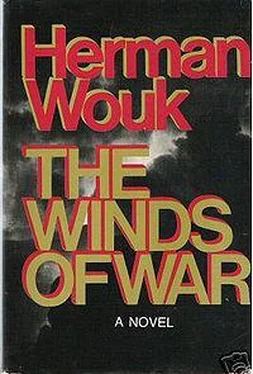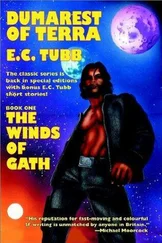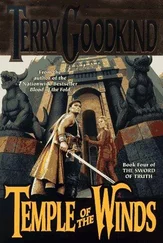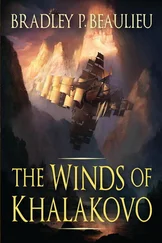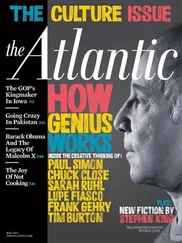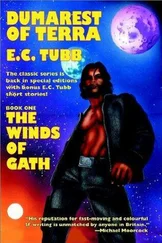Herman Wouk - The Winds of War
Здесь есть возможность читать онлайн «Herman Wouk - The Winds of War» весь текст электронной книги совершенно бесплатно (целиком полную версию без сокращений). В некоторых случаях можно слушать аудио, скачать через торрент в формате fb2 и присутствует краткое содержание. Год выпуска: 1971, Издательство: Collins, Жанр: Историческая проза, на английском языке. Описание произведения, (предисловие) а так же отзывы посетителей доступны на портале библиотеки ЛибКат.
- Название:The Winds of War
- Автор:
- Издательство:Collins
- Жанр:
- Год:1971
- ISBN:нет данных
- Рейтинг книги:4 / 5. Голосов: 1
-
Избранное:Добавить в избранное
- Отзывы:
-
Ваша оценка:
- 80
- 1
- 2
- 3
- 4
- 5
The Winds of War: краткое содержание, описание и аннотация
Предлагаем к чтению аннотацию, описание, краткое содержание или предисловие (зависит от того, что написал сам автор книги «The Winds of War»). Если вы не нашли необходимую информацию о книге — напишите в комментариях, мы постараемся отыскать её.
About the Author
Herman Wouk's acclaimed novels include the Pulitzer-Prize winning
;
;
;
;
;
; and
.
The Winds of War — читать онлайн бесплатно полную книгу (весь текст) целиком
Ниже представлен текст книги, разбитый по страницам. Система сохранения места последней прочитанной страницы, позволяет с удобством читать онлайн бесплатно книгу «The Winds of War», без необходимости каждый раз заново искать на чём Вы остановились. Поставьте закладку, и сможете в любой момент перейти на страницу, на которой закончили чтение.
Интервал:
Закладка:
“Yes, well, I do have a thing or two on my mind, and you’ve got to go about your business too. Nice seeing you, Pug,” said Admiral Kimmel, in a sudden tone of dismissal.
Janice answered Pug’s telephone call and warmly urged him to come and stay at the house. Pug wanted a place where he could drop his bags, and get into uniform to go to the California . He drove out in a Navy car, took suitable if brief delight in his grandson, and accepted Janice’s commiseration over his ship with a grunt. She offered to get his whites quickly pressed by the maid. In the spare room he opened his suitcase to pull out the crumpled uniform, and his letter to Pamela Tudsbury fell to the floor.
In a dressing gown he glanced through the letter, which he had written during the long hop from Guam to Wake Island. It embarrassed him as one of his old love letters to Rhoda might have. There wasn’t much love in this one, mostly a reasoned and accurate case for his living out his life as it was. The whole business with the English girl — romance, flirtation, love affair, whatever it had been — had begun to seem so far away after his stops in Manila and Guam, so dated, so unlike him, so utterly outside realities and possibilities! Pamela was a beautiful young woman, but odd. The best proof of her oddness was her very infatuation with him, a grizzled United States Navy workhorse with whom she had been thrown together a few times. Dour and repressed though he was, she had ignited a flash of romance in him in those last turbulent hours in Moscow. He had allowed himself to hope for a new life, and to half believe in it, in his elation over his orders to the California .
And now — how finished it all was! California , Pamela, the Pacific Fleet, the honor of the United States, and — God alone knew — any hope for the civilized world.
A knock at the door; the voice of the Chinese maid: “Your uniform, Captain?”
“Thank you. Ah, that’s a fine job, I appreciate it.”
He did not tear the letter up. He did not think he could write a better one. The situation of a man past fifty declining a young woman’s love was awkward and ridiculous, and no words could help much. He slipped the envelope into his pocket. When he passed a mailbox on his way to the Navy Yard, he stopped and mailed it. The clank of the box was a sad sound in a sad day for Captain Victor Henry.
Sadder yet was the trip to the California , through foul-smelling water so coated with black oil that the motor launch cut no wake, but chugged slimily along in smoky air, thumping like an icebreaker through a floating mass of black-smeared garbage and debris. The launch passed all along Battleship Row, for the California lay nearest the channel entrance. One by one Pug contemplated these gargantuan gray vessels he knew so well — he had served in several — fire-blackened, down by the head, down by the stern, sitting on the bottom, listing, or turned turtle. Grief and pain tore at him.
He was a battleship man. Long, long ago he had passed up flight school. Navy air had seemed to him fine for reconnaissance, bombing support, and torpedo attacks, but not for the main striking arm. He had argued with the fly-fly boys that when war came, the thin-skinned carriers would lurk far from the action and would fuss at each other with bombings and dogfights, while the battleships with their big rifles came to grips and slugged it out for command of the sea. The fliers had asserted that one aerial bomb or torpedo could sink a battleship. He had retorted that a sixteen-inch steel plate wasn’t exactly porcelain, and that a hundred guns firing at once might slightly mar the aim of a pilot flying a little tin crate.
His natural conservative streak had been reinforced by his football experience. To him, carriers had been the fancy-Dan team with tricky runners and razzle-dazzle passers; battlewagons, the heavy solid team of chargers, who piled up the yardage straight through the line. These tough ground gainers usually became the champions. So he had thought — making the mistake of his life. He had been as wrong as a man could be, in the one crucial judgment of his profession.
Other battleship men might still find excuses for these tragic slaughtered dinosaurs that the launch was passing. For Pug Henry, facts governed. Each of these vessels was a grand engineering marvel, a floating colossus as cunningly put together as a lady’s watch, capable of pulverizing a city. All true, all true. But if caught unawares, they could be knocked out by little tin flying crates. The evidence was before his eyes. The twenty-year argument was over.
The setting sun cast a rosy glow on the canted superstructure of the California . She listed about seven degrees to port, spouting thick streams of filthy water in rhythmic pumped spurts. The smoke-streaked, flame-blistered, oil-smeared steel wall, leaning far over Pug’s head as the motor launch drew up to the accommodation ladder, gave him a dizzy, doomed feeling. The climb up the canted and partly submerged ladder was dizzying, too.
What an arrival! In bad moments in Kuibyshev, on Siberian trains, in Tokyo streets, in the Manila Club, Pug had cheered himself with pictures of his reception aboard this ship: side boys in white saluting, honor guard on parade, boatswain’s pipe trilling, commanding officers shaking hands at the gangway, a sweet triumphant tour of a great ship shined up to holiday beauty and brilliance for the eye of a new captain. Often he had played a minor part in such rituals. But to be the star, the center, the incoming “old man”! It was worth a lifetime of the toughest drudgery.
And now this!
A vile corrupt stink hit Victor Henry in the face as he stepped on the sloping quarterdeck of the California , and said, “Request permission to come aboard, sir.”
“Permission granted, sir.” The OOD’s salute was smart, his sunburned boyish face attractive. He wore grease-streaked khakis, with gloves and a spyglass. Five corpses lay on the quarterdeck, under sheets stained with water and oil, their soggy black shoes projecting, their noses poking up the cloth, water trickling from them down the slanted deck toward the OOD’s stand. The smell came partly from them, but it was a compound of reeks — seeping smoke, gasoline fumes from the pumps, burnt oil, burnt food, burnt paper, burnt flesh, rotted food, broken waste lines, a rancid-mildewy effluvium of disaster, of a great machine built to house human beings, broken and disintegrating. Unshaven sailors and officers in dirty clothing wandered about. Above the filth and mess and tangled hoses and scattered shells and ammo boxes on the main deck, the superstructure jutted into the sunset sky, massive, clean, and undamaged. The long fourteen-inch guns were trained neatly fore and aft, newly and smoothly painted gray, tampions in place, turrets unscathed. The ship bristled with A.A. guns. The old Prune Barge was tantalizingly alive and afloat — wounded, but still mighty, still grandiose.
“I’m Captain Victor Henry.”
“Yes, sir? Oh! Yes, sir! Captain Wallenstone’s been expecting you for quite a while.” He snapped his fingers at a messenger in whites, and said with a winning sad grin, “It’s awful that you should find the ship like this, sir. Benson, tell the C.O. that Captain Henry is here.”
“One moment. Where’s Your C.O.?”
“Sir, he’s with the salvage officers down in the forward engine room.”
“I know the way.”
Walking familiar decks and passageways that were weird in their fixed slant, climbing down tipped ladders, choking on smoke, gasoline, and oil fumes, and a gruesome smell of rotting meat, penetrating ever deeper into gloom and stench, realizing that these fume-filled spaces were explosive traps, Victor Henry got himself down to the forward engine room, where four officers huddled on a high catwalk, playing powerful hand-lights on a sheet of oil-covered water. By an optical illusion, the water half-drowning the engines appeared slanted, rather than the listing bulkheads.
Читать дальшеИнтервал:
Закладка:
Похожие книги на «The Winds of War»
Представляем Вашему вниманию похожие книги на «The Winds of War» списком для выбора. Мы отобрали схожую по названию и смыслу литературу в надежде предоставить читателям больше вариантов отыскать новые, интересные, ещё непрочитанные произведения.
Обсуждение, отзывы о книге «The Winds of War» и просто собственные мнения читателей. Оставьте ваши комментарии, напишите, что Вы думаете о произведении, его смысле или главных героях. Укажите что конкретно понравилось, а что нет, и почему Вы так считаете.
